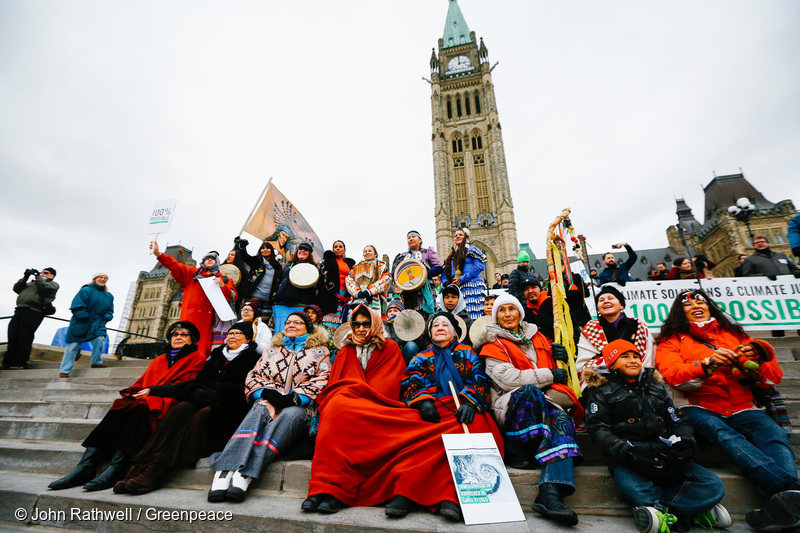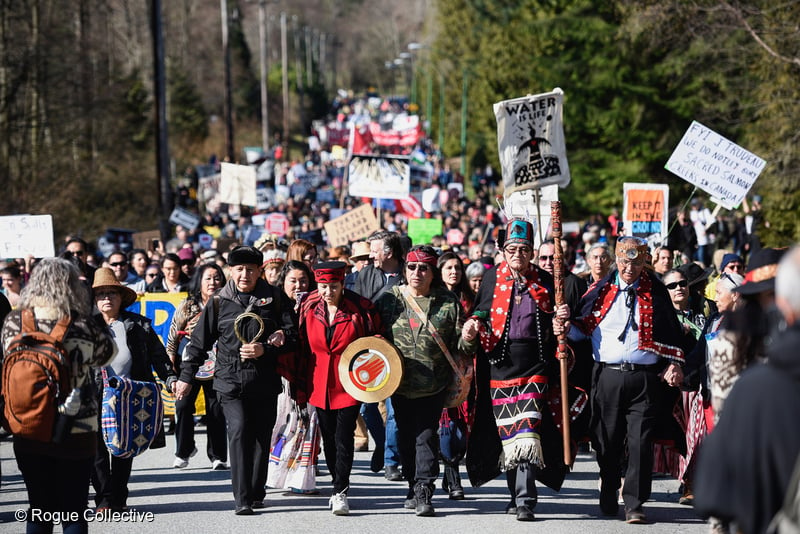Toronto – Today, the Intergovernmental Panel on Climate Change (IPCC) Working Group III delivered the third part of the Sixth Assessment Report to world governments.
Focusing on the ways to mitigate climate change, the latest report declares that solutions for meeting the Paris Agreement warming limit exist. However they won’t materialise with governments’ current policies, which are setting us up for failure. The critical years to halve global emissions by 2030, and set the course towards zero, are now.
Keith Stewart, Senior Energy Strategist, Greenpeace Canada said:
“We are out of time — and governments, corporations and financial institutions are out of excuses. One way that Canada could punch above its weight is to redirect the money pipeline from fossil fuels to the climate solutions advanced by the IPCC. It is a national disgrace that Canada’s Big Five banks are all among the top 20 global funders of fossil fuels and that their fossil fuel funding grew by 70% last year. There can be no excuse for throwing more money into fossil fuels when we so desperately need to invest in a cleaner, more just future.”
Kaisa Kosonen, Senior Policy Advisor, Greenpeace Nordic said:
“Fossil fuels and the money flowing into them is the root cause of climate crisis, conflicts and war, causing immense suffering to people all over the world. While our leaders have been claiming they’re doing their very best on climate, the scientists have just proven they are not. Governments could do multiple times more, with so many benefits! They have no excuses to continue throwing money into fossil fuels that profits a few. It’s time to stop doing better and start doing enough.
Both the threats and the opportunities are larger than ever. So is the power of people who unite for change.”
According to the IPCC, solutions exist for at least halving global greenhouse gas emissions by 2030, in line with the Paris Agreement warming limit, with more than half of the potential coming at low or even negative costs. In addition to the vital role of solar, wind, electrification and efficiency, the report underlines the importance of restoring and protecting forests and other natural ecosystems, improving carbon sequestration in agriculture and shifting diets. Money exists to solve the problems but more public and private funding still flows to fossil fuels than for climate solutions. To achieve the needed emission cuts in the near future, financial flows to solutions will need to multiply as they cease for fossil fuels, as there’s no room for new fossil fuel infrastructure.
Today’s report confirms that countries’ climate plans and policies are not in line with the Paris Agreement warming limit, only further increasing inequity and impacting communities already made more vulnerable by the climate crisis. The report’s conclusions provide the framework to governments on how to meet the promises made last year in Glasgow at the UN climate summit, where they agreed to revisit their national mitigation targets by the end of 2022. The next summit, COP27 in Egypt later this year, is where countries will have to respond to the IPCC findings on the continuous lack of action.
The Working Group III report is the third contribution to the IPCC Sixth Assessment and complements the reports from Working Group I on the physical science of climate change
and Working Group II on impacts, adaptation and vulnerability. The full story of the IPCC Sixth Assessment Report will be brought together by the Synthesis Report in October.
ENDS
Experts available for comment.
Independent Greenpeace Key Takeaways briefing from Mitigation of Climate Change (AR6 WGIII) report available.
Images: Images and videos of climate change impacts are available from the Greenpeace Media Library.
Contact:
Brandon Wei, Communications Officer, Greenpeace Canada
[email protected], +1 (778) 772-6138
Keith Stewart, Senior Energy Strategist, Greenpeace Canada
[email protected], +1 (514) 594-1221
Greenpeace International Press Desk, [email protected], +31 20 718 2470
(24 hours)



